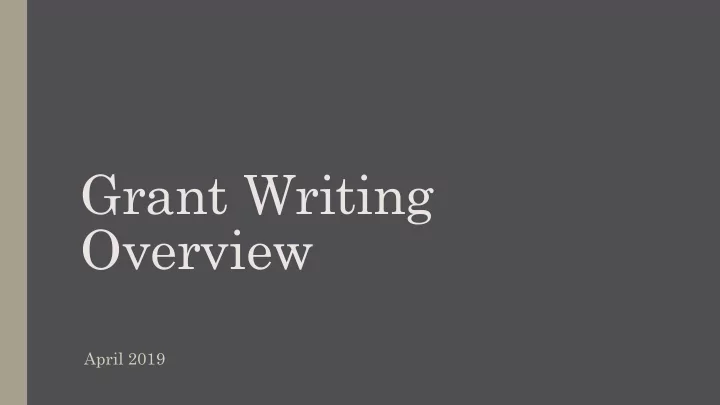

Grant Writing Overview April 2 0 19
Project development Prepare to apply Elements of a proposal Grant Budget Common attachments Writing Common mistakes Steps Helpful hints Routing Copies Submission tips
Project Development • Identifying a Project Get input from public, partners, stakeholders on the problem or need Brainstorm solutions and prioritize Your Solution is your project
Should You Pursue the Project? • Is it identified in community or regional plans? • Does it have support from leadership? • Do you have or can you recruit staff for project? • Do you have partners that can help? • Will you need to continue funding it in the future?
Preparing to Apply • Finding a Funding • Plan Ahead for: Opportunity • Resolutions • Reviewing the Solicitation • Forming Partnerships Eligibility? • Letters of Support Funding Level? • Collecting Data Match Requirement? • Entering into MOA/MOU Deadlines Collect Background Info •
Elements of a Proposal • Cover Letter • Project Narrative Organizational History • Title Page Approach or Project Design • Executive Summary Goals and Objectives Timetable • Statement of Need Management and Staff
Elements of a Proposal (Cont.) • Budget • Budget Narrative • Evaluation Plan (Performance Measures) • Sustainability Plan (How will it continue) • Attachments
Budget • Demonstrate a clear relationship between the objectives/activities and the budget • Follow solicitation regarding allowable costs categories • Common line items: Personnel, Fringe Benefits, Supplies, and Indirect Costs
Budget - Personnel • Full Time Equivalence • Part-time example: (FTE) expresses how much 20 hrs. x 52 weeks is 1 ,040 time an employee will hours per year spend on the project 1,040 ÷ 1,950 = .53 FTE • 1,950 hours/year is 1 FTE
Budget – Fringe Rate • Check with your Accounting Department for the latest Fringe Rate • Fringe is FICA, Med FICA, Social Security, health insurance, retirement, life insurance, and other • Example: Salary is $20,670 x Fringe Rate of 40% = $8,268
Budget – Indirect Costs • Example: $250,000 Total Allocation Allocation Minus Non-Allowable • Example: $250,000 - $5,000 = Costs $245,000 • Example 21.23% or .2123 Indirect Cost Rate (IDC) • IDC x Allowable Costs ÷ by 1+.2123 Formula • $34,356 Allowable Indirect Costs
Common Attachments • Grant Application forms • Assurances and Certifications • Proof of nonprofit status (IRS document) • Board of Directors List • Audited Financial Statements
Common Attachments (Cont.) • Letters of Support • Memorandum of Understanding (MOUs) • Staff Resumes or Job Descriptions (vacant positions) • Indirect Cost Rate Agreement
Common Mistakes • Failure to have the Grant forms signed • Failure to fully comply with all of the requirements • Failure to sell your program and demonstrate that it aligns with the grant-maker’s mission • Failure to be concise • Spelling and grammatical errors
Common Mistakes (Cont.) • Failure to match the numbers in the budget to the budget narrative • Failure to write for your audience • Failure to format the proposal according to the requirements (page limits, font size, margins, etc.)
Proofing • Read your proposal aloud • Review against the solicitation to make sure important elements have not been missed
Routing • Route internally according to your organization’s policies prior to submitting to the funding agency
Copies • Make copies and distributed internally, as needed • Prepare original for the grant maker •
Submission Tips • Submit early according to the grant-maker’s directions in case of internet connectivity problems • Get a confirmation message that the grant was received. If it times out, restart the submission after every few minutes until you get confirmation Contact our network administrator and/or contact the grant agency’s network administrator, for tips on submitting
Sigh of Relief! Do your office filing and tidying Patty Heyano, Program Development Department Director Phone: 9-842-6221 direct Email: pheyano@bbna.com
Recommend
More recommend